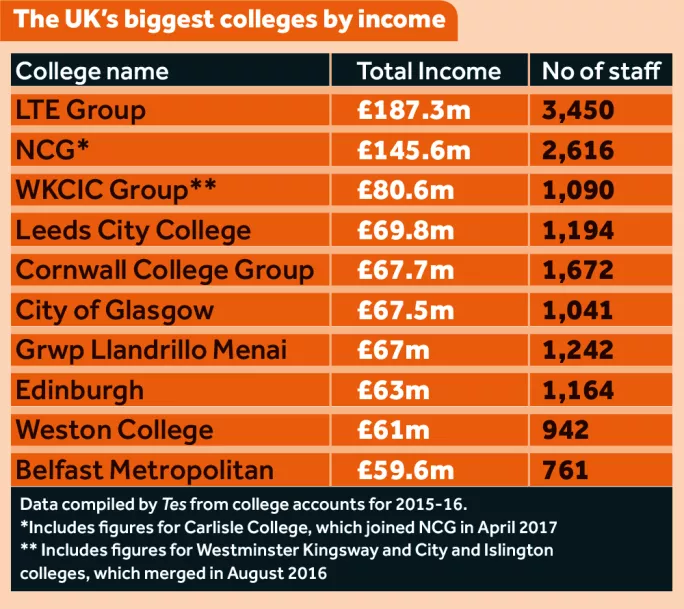College groups: will slow and steady win the race?

Since the government announced it was launching area reviews of college provision across England, many have been predicting an expansion in larger college groups.
But, despite dozens of mergers being announced since the first reviews started in 2015, the growth of college groups has been slow. Tes analysis of college accounts reveals that the biggest group in 2014-15, NCG, actually saw its income drop by more than £40 million in 2015-16.
The group says this can largely be attributed to the winding down of the Work Programme and the end of a European Social Fund contract. However, NCG has since merged with Carlisle College, and is in advanced talks with Lewisham Southwark College.
The biggest college organisation in the FE sector by income is now the LTE Group, the “integrated education and skills group” created by The Manchester College in 2016, which boasted an income of £187 million in 2015-16.
The group also consists of: distance and online learning provider MOL; Total People, which offers workplace learning; and Novus, a provider that delivers skills to people furthest away from education, including through prison-based learning. The group employed 3,450 people in 2015-16.
What may come as a surprise, though, is that only six of the 10 biggest colleges in the UK last year were in England. Scotland’s City of Glasgow and Edinburgh colleges, Grwp Llandrillo Menai - which oversees three colleges in North and West Wales - and Northern Ireland’s Belfast Metropolitan College were among the UK’s biggest FE organisations in 2015-16 (see table, above).
Ian Pretty, chief executive of the Collab Group, says the sector has to “face up to the fact that the business model of old, of a large number of small colleges, is not an efficient model any more”.
“If you look at some of the other things the government is focused on, like institutes of technology and the Sainsbury review, the idea of a regional college group begins to have currency,” he adds. “It is about how we create a model that allows flexibility and adaptability, while also being financially sustainable.”
The importance of delegation
Dame Ruth Silver, founding president of the Further Education Trust for Leadership, expects that the big players in the sector will “spread their tentacles”.
“In many ways, [college groups] are more strategic [than smaller, merged colleges],” she says. “People underestimate the management time that goes into mergers, and with groups, it is often much more strategic … From my experience, they allow the local [provision] to flourish, and they almost build a community of colleges and providers.”

NCG currently consists of Newcastle, Kidderminster, West Lancashire and Carlisle colleges, as well as training providers Intraining and Rathbone Training, and Newcastle Sixth Form College. Chief executive Joe Docherty says he expects other groups will grow due to a “policy environment which is supportive of mergers”. In 2015-16, NCG was granted permission to receive separate funding contracts for its constituent parts. As a result, Docherty says, this year these parts will appear separately in league tables for the first time. “That’s a significant development - nobody attends NCG or is taught by NCG,” he explains.
“If you try and run multiple colleges in the way you do a single site, then I think you’ll run into difficulties. Therefore, delegating responsibility and accountability is important. I run the group and principals run the colleges.”
But the group has no plans to expand, he adds. “Getting bigger isn’t in our strategy; getting bigger isn’t a strategy. We’re very much driven by our purpose. If a college joining our group furthers that purpose, we will consider it. We wouldn’t rule anything out, but we don’t approach other colleges.”
Sir Frank McLoughlin, director of leadership at the Education and Training Foundation, says it’s important for a college within a group structure to “retain its identity”.
“I passionately believe that, in a group structure, you’ve got to devolve power to the college principals, and fully delegate the power to run their space. It isn’t just about getting bigger: there are many examples of organisations that have got bigger and have not worked,” he explains.
LTE declined to comment about the structure of its group.
You need a Tes subscription to read this article
Subscribe now to read this article and get other subscriber-only content:
- Unlimited access to all Tes magazine content
- Exclusive subscriber-only stories
- Award-winning email newsletters
Already a subscriber? Log in
You need a subscription to read this article
Subscribe now to read this article and get other subscriber-only content, including:
- Unlimited access to all Tes magazine content
- Exclusive subscriber-only stories
- Award-winning email newsletters